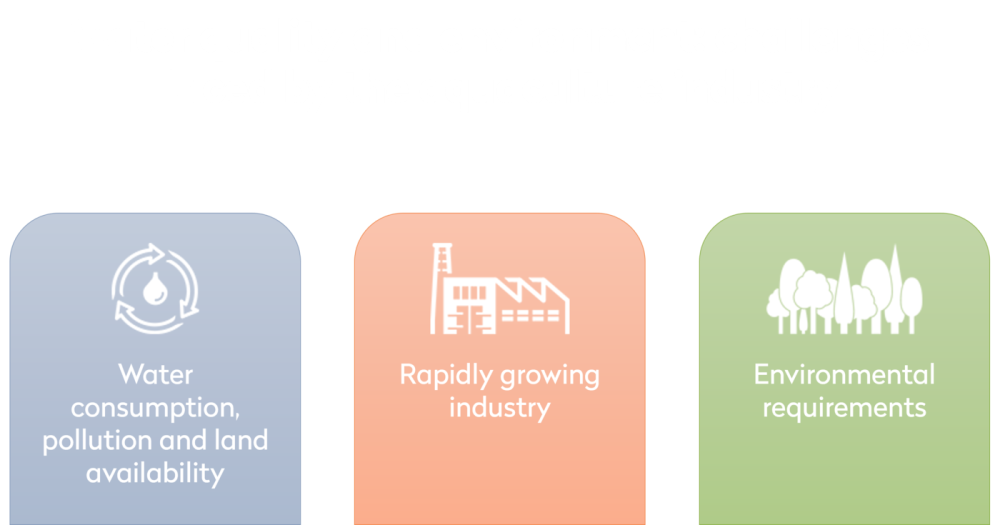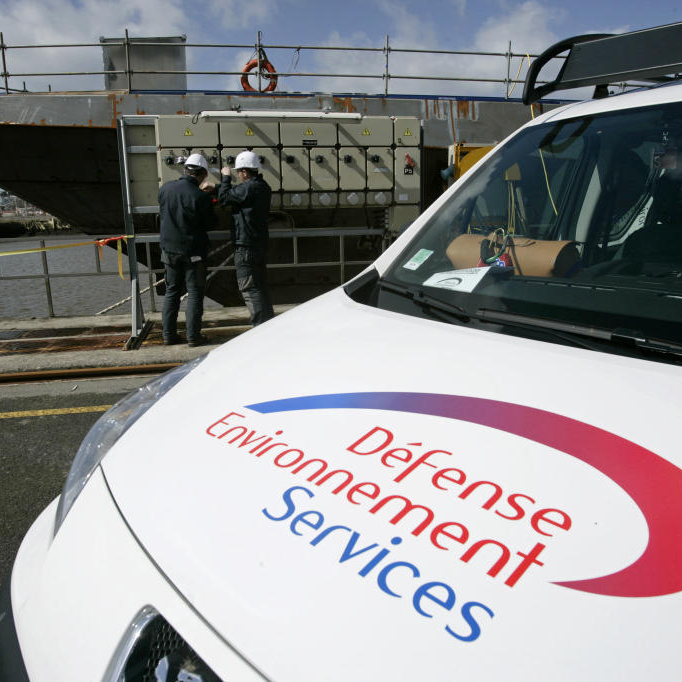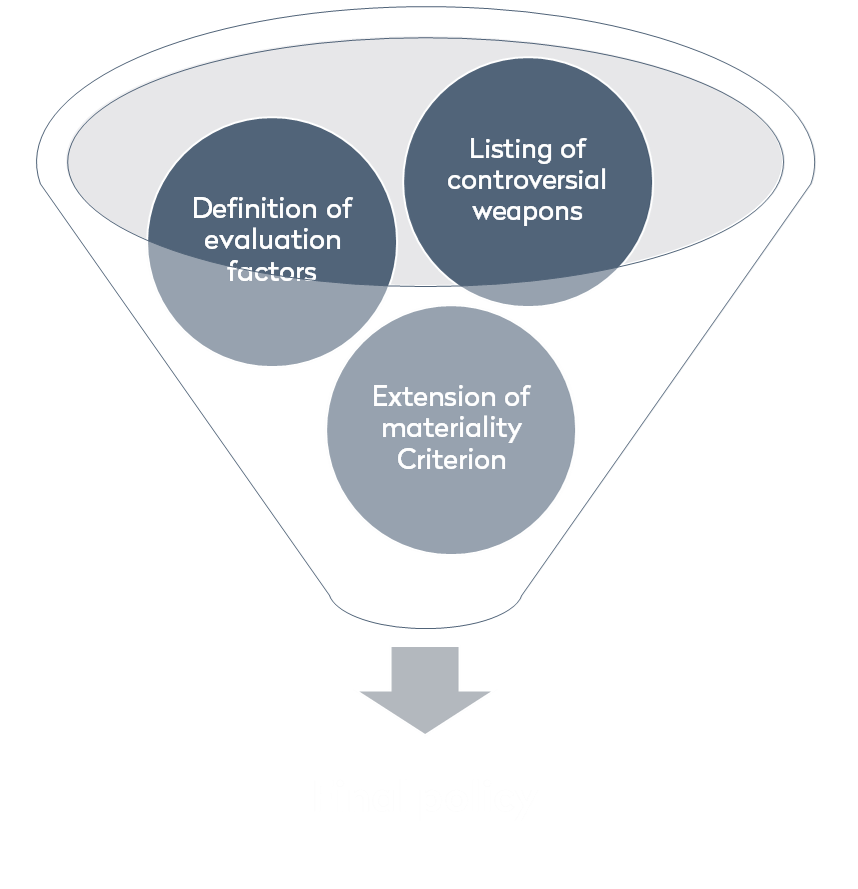Bluefin tuna – an iconic example for recovery
Bluefin tuna is known for its size and price. A new management strategy is to ensure the long-term sustainable management of the stocks in the Atlantic.
At Bonafide, sustainability is a high priority. The relatively recent regulation and our dependence on external partners repeatedly present us with challenges. In this blog article, we want to explain in a transparent manner how we deal with such issues. In this case, we will use our exclusion criteria and our portfolio company Veolia Environnement S.A. to provide an example.
In such cases, entering into a dialogue with the company is crucial for us to be able to make an informed decision. So far, there is no uniform definition of "sustainability". Accordingly, different investors have different expectations.
Veolia S.A. is a listed company with its registered office in Paris. Its business focuses on water/wastewater, waste management and energy supply. The company employs around 171,000 people.
Veolia Water Technologies provides the aquaculture industry with sustainable solutions for onshore fish farming and recirculation systems. The company is an industry leader in providing solutions for environmentally sound and sustainable aquaculture. To find out more, watch the video below.

On 15 September 2022, we received a report from ISS ESG that Veolia Environnement S.A., one of our portfolio companies, had a verified involvement in controversial weapons.
In detail, ISS ESG assessed Veolia Environnement SA to be involved in the Triomphant class ballistic missile submarine (SSBN) programme through its wholly owned subsidiary Veolia Environnement Industries SAS. These submarines are dedicated launch platforms for M51 submarine-launched ballistic missiles, which have the sole purpose of carrying nuclear warheads. Défense Environnement Services (DES), a joint venture of Veolia Environnement Industries, is a provider of bespoke on-board and shipyard logistics for the maintenance and repair of Triomphant class SSBNs. Involvement by DES in the Triomphant class SSBN programme is confirmed by the company.
In case we find Veolia’s involvement to be material and no amicable solution with the company were to be found within the framework of an engagement, Bonafide would have to divest its stake in Veolia within three months in accordance with our exclusion policy.

Assessment criteria
Numerous assessment criteria can be used by Bonafide to determine whether Veolia has in fact made a material contribution to the manufacture of controversial weapons. Unfortunately, to date there is no standardised procedure for navigating the numerous grey areas and definitively assessing the material nature of a contribution.
However, it makes sense to start by assessing what is meant by “controversial weapons” in the first place. In theory, important criteria in defining weapons as “controversial” or not include the legality of the weapons, the proportionality of the military benefit compared to the destructive power of the weapons and the ability to differentiate between civilian and military targets when using the weapons. Therefore NBC weapons (nuclear, biological, chemical), anti-personnel mines, cluster munitions, uranium munitions and phosphorus munitions are more likely to be categorised as controversial. In practice, however, other definitions are also used. For example, a distinction is made between those countries covered by the Nuclear Non-Proliferation Treaty (USA, UK, France, Russia, China) and other countries (India, Pakistan, North Korea, India). And the use of phosphorus munitions, which is still common today, is also often endorsed. The PAI on controversial weapons also only mentions anti-personnel mines, cluster munitions and chemical and biological weapons.
Next, the definition of the weapon itself should also be specified. In this case, distinctions are often made between the warhead, the delivery system (e.g. missile), and the transport system. While the first two components are most likely to be categorised as a weapon, the transport system is often omitted. The reason for this is, firstly, that if transport systems were taken into account, the number of components to be monitored would be inappropriately large.
Secondly, most transport systems are also covered by the "dual use" criterion, which states that weapons components which have a civilian use in addition to a military use, or which have a non-controversial military use in addition to a controversial use, should not lead to their manufacturers being excluded, given that manufacturers usually have no say over how and where their products are used.
The concept of manufacture also requires further clarification. Here, a rough distinction can be made between a weapon’s design, its manufacture and its maintenance. In order to ensure that a weapon functions properly, all three activities are indispensable. In particular, maintenance work, which intuitively occurs after the initial manufacture of the weapon, therefore very likely also falls within the scope of the exclusion criteria. In addition, we need to clarify whether only companies directly involved in the aforementioned activities should be considered manufacturers, or if companies that are only indirectly involved but potentially make an equally material contribution should also be included, for example highly specialised suppliers. To answer this question, the last step is to assess the material contribution of the respective activity.
Whether a company's contribution to the manufacture of the weapon should be classified as material is, in our view, best assessed on the ease with which it could be substituted. In principle, it must be assumed that all steps in the value chain are material for the manufacture of the weapon, but this does not necessarily mean that the activity of each individual company in the value chain is also material. In our view, the performance of activities for which numerous alternatives exist and which could be substituted without difficulty should not necessarily be classified as material. In particular, the scope and degree of specialisation of the activity performed and the existing competitive environment provide an important indication of the substitutability of the activity.

In order to assess the facts described by ISS, we entered into dialogue with Veolia on 21 November. Our aim was, in particular, to gain a better understanding of the materiality of the contribution of DES within one month and, if necessary, to obtain a letter of intent from Veolia regarding the divestment of shares in DES. Otherwise, in accordance with our exclusion policy, we would be forced to sell our stake in Veolia.
Within a very short time, we received an initial response from Veolia which addressed many of the above points, but which did not fully dispel our doubts about the material nature of the activity provided. Through further research, these concern could be overcome as well, so that we were ultimately able to assess the service provided by DES as not material, which meant that selling our stake in Veolia was not necessary.

In specific terms, in the present case we have come to the conclusion that three of the four assessment factors mentioned above must be assessed negatively if anything. However, we do not consider the criterion of a material contribution, and therefore the involvement of Veolia in controversial weapons, to have been met. Selling our stake in Veolia as a result of our exclusion criteria is therefore not necessary.
It is clear to us that nuclear weapons also meet our definition of controversial weapons and that, for example, no exception should be made for countries within the framework of the Nuclear Non-Proliferation Treaty.
Similarly, we also consider nuclear submarines to be part of the weapon, since they are used solely for launching intercontinental ballistic missiles, which in turn exclusively carry nuclear warheads. The "dual use" criterion or a possible blanket non-consideration of the transport system of controversial weapons therefore does not apply in the present case.
Contrary to Veolia’s argumentation, we also see DES as being involved in the maintenance of the submarines and therefore also of the weapon.
Although, according to Veolia, DES only provides support activities and does not carry out any direct work on the submarines themselves, we also consider support activities to be part of the maintenance work insofar as they are material. We therefore do not make a distinction between the direct and indirect manufacture of the weapon.
Unlike ISS ESG, we do not consider the criterion of a material contribution to have been met. Where ISS ESG considers logistics services performed by DES in the direct context of Triomphant class SSBNs to be an instrumental contribution to the maintenance and repair of these submarines , we also try to take into account the replaceability of the service rendered. With its team of 13 employees, which corresponds to about 1% of the people working on site, DES does not appear to have played a substantial role in the maintenance work. Moreover, the services provided, which include in particular the supply of air, electricity and power tools on board, as well as part of the goods logistics and warehouse management in the dock (in collaboration with other logistics companies), do not appear to be overly specialised. In our view, a competitor could quickly compensate for any failure by DES, meaning that there would be no long-term interruption of maintenance work.
Finally, we wish to point out that we have taken the present controversy as an opportunity to specify our policy on controversial weapons.
For example, the policy now includes a precise list of weapons that we consider to be controversial and the criteria that should be taken into account when assessing our potential involvement. Moreover, as we aspire to treat like with like, the revised policy will lay greater emphasis on the practicality of the criteria, particularly in relation to the scope of the activities to be assessed. Accordingly, the scope of application of the exclusion criteria has been defined in more detail, meaning that merely providing support activities or working on the transport system will no longer be covered by the definition of controversial weapons in future.

Comments